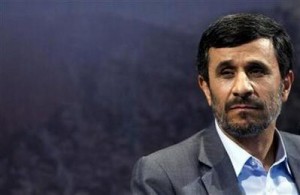Egypt Warms To Iran
 The Wall Street Journal reports:
The Wall Street Journal reports:
CAIRO—Iran and Egypt's new government signaled Monday they were moving quickly to thaw decades of frosty relations, worrying the U.S., Israel and Saudi Arabia that the overtures could upset the Mideast's fragile balance of power.
Iran said it appointed an ambassador to Egypt for the first time since the two sides froze diplomatic relations more than three decades ago, the website of the Iranian government's official English-language channel, Press TV, reported late Monday.
Also Monday, officials at Egypt's Ministry of Foreign Affairs confirmed that new foreign minister Nabil Elaraby is considering a visit to the Gaza Strip—an area controlled by Hamas, a militant Palestinian Islamist group backed by Tehran and until now shunned by Cairo.
The announcements follow a rare meeting earlier this month between a high-level Iranian diplomat and Mr. Elaraby, after which the foreign minister told reporters that Egypt has "opened a new page" with Iran.
American officials said they are concerned that Egypt's apparent determination to re-establish relations with Iran is part of a broader reordering of its foreign policy. They worry that such a turn could empower Iran and its regional clients Hamas in the Gaza Strip and Hezbollah in Lebanon, both of which are labeled terrorist groups by the U.S.
Egypt's outreach has also extended to Syria, a close ally of Iran. In early March, Egypt's new intelligence chief, Murad Muwafi, chose Syria for his first foreign trip. It remains unclear what was discussed at the meeting, previously reported by The Wall Street Journal.
For decades, Egypt was a vital player in a Middle East balance of power: With its large population, U.S.-financed military and diplomatic ties with Israel, it was a counterweight against Israel's foes, primarily Iran and Syria. But as Iran's power in the region has grown and the Middle East has become more defined by political Islam, Egypt's reliably anti-Iranian stance cost it significant diplomatic capital. With Cairo unable to engage Tehran, it lost its position as one of the region's chief diplomatic brokers, eclipsed by Qatar, Syria and Saudi Arabia.
Egyptian officials and several foreign-policy analysts say the new diplomacy isn't so much an expression of affinity with Iran as it is a broader effort to reclaim lost diplomatic prestige. Egypt's new government presents the policy shift as part of a general diplomatic reopening, rather than a reordering, of its regional relationships.
"Egypt's role cannot be underestimated. But that role over the last few decades, I think 30 years or so, has diminished," said Menha Bakhoum, spokeswoman for Egypt's Ministry of Foreign Affairs. "If there's anything happening now, I think that will be regaining that position that we've had for years and years and years."
Western reactions to Egypt's entreaties to Iran were exaggerated, Ms. Bakhoum said Monday.
Click here to read more.

